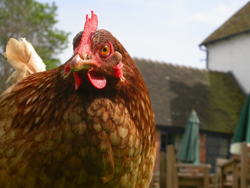Controlling animal to human disease transmission
Diseases that can be transmitted from animals to humans, so-called zoonoses, pose important public health risks. When these diseases are food-borne (transmitted through the food chain via animals consumed by people as part of their diets), their detrimental effects can spread rapidly across large populations creating significant negative social and financial impactS. European researchers initiated the ‘Network for prevention and control of zoonoses’ (MED-VET-NET) project to combine strengths in veterinary science, medicine and food safety in order to enhance prevention and control of zoonoses in Europe. MED-VET-NET consisted of numerous public health and veterinary institutes from 10 European countries as well as a scientific communications small and medium-sized enterprise (SME) to disseminate information. Scientists evaluated specific bacteria, parasites and viruses for their resistance to drugs, degree of virulence and public health and consumer risks leading to prioritisation of hazards. As a result, researchers developed 17 standardised laboratory and epidemiological procedures and established 23 databases or DNA repositories to facilitate the detection and control of specific microorganisms. They also created new methods for identification and typing of the microorganisms and established the molecular typing network, PulseNet Europe, with links to PulseNet USA and other networks around the world. MED-VET-NET further developed novel diagnostic methods, among them a simple blood test for Salmonella and Campylobacter (bacteria that can cause diarrhoea, fever and cramps in people). Overall, the MED-VET-NET project led to a highly effective worldwide collaboration on prevention, diagnosis and control of zoonoses. The project resulted in publication of over 160 authoritative papers in peer-reviewed journals, four sets of guidelines and 3 critical reviews as well as a strategic paper addressing assessment methodology for disease burden and cost-of-illness of food-borne zoonoses in Europe. Continued collaboration through the sustainable MED-VET-NET network should ensure a greater degree of food safety for European citizens as well as decreased health costs for the EU. The self-funded Association, which currently comprises all 14 of the Network’s scientific partners was officially launched in October 2009.







